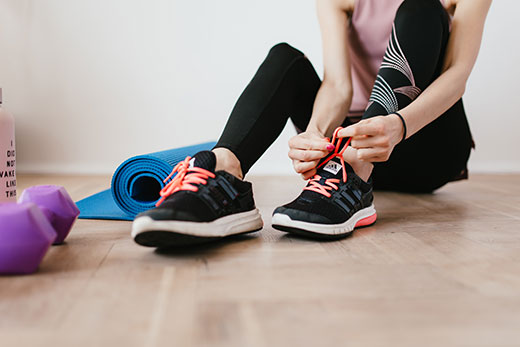
Many have found that fitting exercise into a daily schedule has been easier while staying at home.
Pandemic bright spot? More people seem to be physically active
K-State experts say now it’s important to maintain those good habits
Feb. 1, 2021
MANHATTAN, Kan. – A silver lining in the COVID-19 pandemic for those who have found themselves at home more is that many have used their spare time to be more active.
Their challenge in the months ahead? Make it stick.
“What we’ve seen is that some of these new habits that people may have developed during the pandemic may be more sustainable than the habits they had previously,” said Emily Mailey, an associate professor of kinesiology at Kansas State University.
“Being active at home or walking in your neighborhood or community is easier to fit into your day, compared to paying for a gym membership and driving there. I think people are finding ways to fit physical activity into their day that will be easier to maintain.”
Listen to an interview by Jeff Wichman with Emily Mailey, Sharolyn Jackson and Erin Tynon on the weekly show, Sound Living
Mailey will be one of the featured speakers Feb. 18 during the online program, Living Well Together, a weekly one-hour series hosted by K-State Research and Extension.
“We’ll be talking about planning physical activity into your schedule,” said Mailey, who also is director of K-State’s Physical Activity Intervention Research laboratory. “It’s important to be intentional and to integrate exercise into your day… and finding a support person to hold you accountable.”
Mailey said a simple way for people to get more activity is to look for “little bits of physical activity” to tie into everyday routines – such as brushing your teeth, washing the dishes or attending an online meeting.
“Enjoyment is one of the key things that we always highlight when encouraging physical activity,” Mailey said. “What one person enjoys doing may be very different from what someone else does. Sometimes we tend to have a very narrow idea of what counts as exercise, but in reality, there are lots of different ways to move your body and be physically active. We’ll encourage people to explore different types of movement to find something they’ll enjoy and would want to continue doing.”
Sharolyn Jackson, the northeast area extension specialist and one of the organizers of Living Well Together, will be a co-presenter with Mailey on Feb. 18. She is also the coordinator of Walk Kansas, an eight-week program to get groups of people walking and moving a distance equivalent to the length of Kansas.
“In Walk Kansas, we want to give people plenty of time to establish that habit, to establish a new norm,” Jackson said. “The eight week period allows them ample time to do that and reach out to people who can support them – their teammates, who are family, friends and co-workers. We know that having a team of supporters is another way to make active habits stick.”
Walk Kansas begins on March 28 and registration is available online.
February’s lineup of Living Well Together sessions include:
- 4 – A Parent’s Guide to Social Media.
- 11 – Love Languages.
- 18 – Make Active Habits Stick.
- 25 – Living Well With Diabetes.
K-State Research and Extension family and consumer sciences agents Erin Tynon (Pottawatomie County) and Rebecca McFarland (Frontier District) will host the Feb. 11 session on Love Languages.
“Communication is one of the hardest parts of all relationships,” Tynon said. “It’s important to understand your own needs, be able to communicate those and empathize with others.”
The Five Love Languages, outlined in a 1992 book by Gary Chapman, are:
- Words of Affirmation.
- Receiving Gifts.
- Acts of Service.
- Quality Time.
- Physical Touch.
“This isn’t just focused on romantic relationships,” Tynon said. “This helps other people better understand you, what makes you tick, and helps communication in relationships. It’s important to understand not only yourself, but also others in a relationship.”
Registration for the February lineup of Living Well Together sessions is available online, and interested persons can also contact their local extension office for more information.
Past sessions in the Living Well Together series are available to view online.

